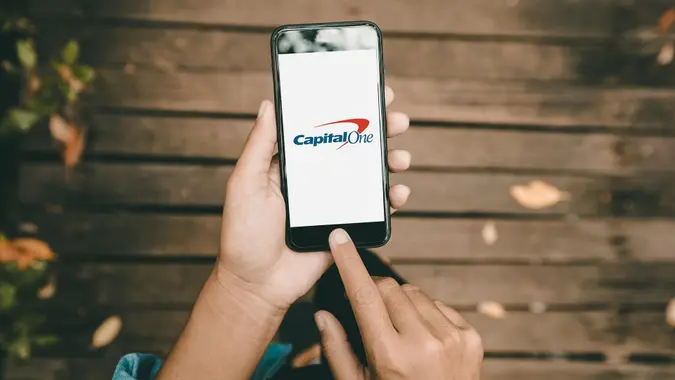The 4 Best Bank Account Options for Kids and Teens

Commitment to Our Readers
GOBankingRates' editorial team is committed to bringing you unbiased reviews and information. We use data-driven methodologies to evaluate financial products and services - our reviews and ratings are not influenced by advertisers. You can read more about our editorial guidelines and our products and services review methodology.

20 Years
Helping You Live Richer

Reviewed
by Experts

Trusted by
Millions of Readers
Having a bank account is important for kids of all ages. In fact, in the long run, it’s even more valuable than you might realize.
“A savings account for a child or teenager should serve as more than just a place to store money,” said Brad Calhoun, president and CEO of Teachers Federal Credit Union. “As a father of three, I recognize the parental desire to do what’s best for our kids, including setting them up early in life for financial success. Opening a youth savings account is a great way to teach younger generations about the importance of saving money and overall money management.”
However, trying to decide which account would be the best choice for your child can be challenging, and there are a lot of banks competing for your business. To give you an idea of some of the best savings, checking and investment account options for kids and teens out there, GOBankingRates spoke to banking professionals and financial experts to get their opinions.
Teachers Federal Credit Union: Youth Savings Account
At Teachers Federal Credit Union, you can open a Youth Savings Account with no monthly fee for just $1. “The Youth Savings Account we offer at Teachers Federal Credit Union is optimized to help save and grow over time with a competitive 3.00% APY on the first $1,000 deposited,” Calhoun said. “For example, adding $5 per day into a Teachers Youth Savings Account for 21 years would result in approximately $40,000.”
Calhoun pointed out that not only will the Youth Savings account provide a safe and easy avenue for the child’s money to grow, but also will give children the opportunity to learn about the power of compound interest and build responsible money habits.
“As they deposit funds from birthdays over the years, they’ll watch their money grow, both introducing the idea of investing and the motivation to save more, ” he said. “When a child turns 21, the account automatically transitions to a Regular Savings Account.”
Spectrum Credit Union: MySavings Youth Account
Kyle Kroeger, a financial manager and founder of ViaTravelers, recommends the My Savings
Youth account from Spectrum Credit Union. “There are no monthly fees to worry about and the best part is the high interest rate — even on accounts with a lower balance under $1,000.”
Spectrum is currently paying 7.00% APY on the first $1,000 deposited and 0.30% APY on balances below or above $1,000. Plus, the account has no minimum balance requirements. “Kids can get an ATM card from the age of 13, which I think is just the right time for a child,” Kroeger said. “You can generally open this account online for your kid. Just bear in mind that when your child turns 21 and they have a bank account especially for minors, they must reapply for a new type of account.”
IncredibleBank: Chill Checking Account
If you have a teenager who is 14 or older who needs to learn to budget and manage money, IncredibleBank‘s Chill Checking account might be the answer. The account requires a minimum opening deposit of $50 and has no minimum balance requirements or monthly maintenance fees. It comes with a Visa debit card, access to over 30,000 ATMs and free Netflix for a year following account opening.
As long as your teen pays the Netflix subscription with the IncredibleBank debit card tied to the account and uses the debit card for at least five transactions (excluding ATMs) each month, the bank will reimburse the actual amount of the Netflix subscription charge or $16.95 — whichever is less. That’s an annual value of $203.40.
Fidelity UTMA Account
Finally, if you’re interested in helping your children learn to invest, you might want to consider this account. “I recommend Fidelity’s UTMA for kids of all ages,” said Steffa Mantilla, certified financial education instructor and founder of Money Tamer. “It’s a custodial account, which means that the parents control the account until they’re an adult. Then the account and all money in it transfers to your child at around age 18 to 25 depending on the state.”
Take note, though — a UTMA account isn’t a normal savings or checking account, so your child should have one of those as well if they want to spend the money like they would with a normal account.
Mantillia said, “What makes Fidelity’s UTMA great is that the money added can be invested into stocks, mutual funds, and ETF’s. While your child is young, you can put birthday money into an index fund and leave it to grow for them. As your child gets older, this account is a great learning tool for your teen to research and choose funds to invest in with money they won’t need for a few years.”
She continued, “While other banks offer custodial accounts, Fidelity’s doesn’t have any maintenance fees and their fund fees are some of the lowest in the industry. There also isn’t a minimum buy-in to the funds, so that $20 birthday money can go directly to buy some stock instead of waiting in a money market account for it to reach the $3,000 minimum buy-in amount that other places have.”
More From GOBankingRates
- One-Third of People Have $100 or Less in Their Checking Accounts, Survey Shows — Here’s How Much Experts Say You Should Actually Have
- Find Out Which Banks Are the Top 100 Banks Leading the US in 2022
- 10 Simple Ways To Start Investing for Any Budget
- 40% of Women Have Less Than $100 in Their Savings Accounts, New Survey Finds
 Written by
Written by  Edited by
Edited by 

























